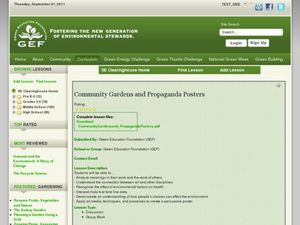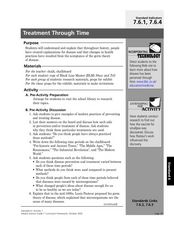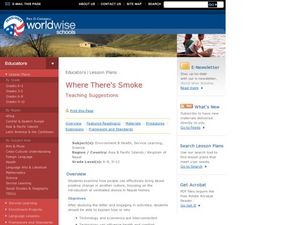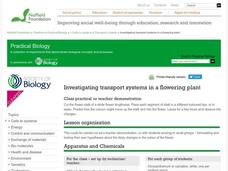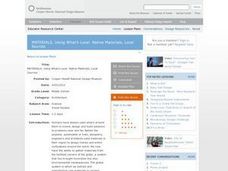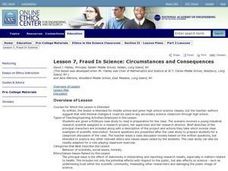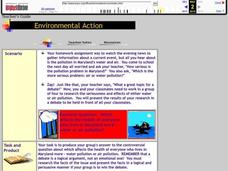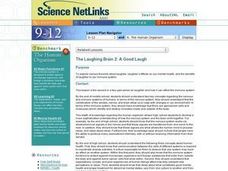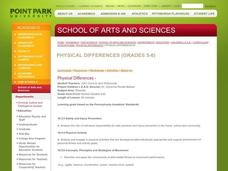American Physiological Society
Hoo Eats Who and What is What in Your Own Backyard?
Bird is the word! Teach life science scholars the importance of our feathered friends and the roles they play in our ecosystem. Using the plan, learners investigate the birds in their areas, determine the biotic and abiotic factors that...
Curated OER
Calculating Your Foodometer
Students explore environmental issues by completing a food production class activity. In this carbon footprint lesson, students discuss the types of foods they eat, where they come from and what types of methods are used to transport...
Curated OER
Community Gardens and Propaganda Posters
Students research community gardens. In this community garden lesson, students discover the history of community gardens and assess the benefits of locally grown food. Students create propaganda posters aimed at inviting discussions...
Pulitzer Center
Extractive Industries
Here is a chance for environmental studies classes to take a critical look at crises occurring around the globe by reading articles and viewing video clips. The human activities under scrutiny are the extraction of oil, logging, and...
Curated OER
Treatment Through Time
Seventh graders explore how disease prevention and treatment changed throughout history. In this life science lesson, 7th graders create a classroom exhibit about this topic. They present their project to visitors.
Curated OER
Where There's Smoke
Students explore technology and how it can be used to bring about change in other cultures. In this investigative lesson students complete several activities using technology.
Curated OER
Teen Driving: Skills, Responsibilities and Reactions
As an introduction to the skills required for and responsibilities of driving, pre-teens and teens engage in a series of activities, chart their response times, and analyze how variables effect these reaction times. Class groups use the...
Curated OER
Vitamin Planet
Middle schoolers explain the function of vitamins in their body. In this health lesson, students identify the six types of vitamins. They create a chart comparing two of them.
Baylor College
Drugs, Risks and the Nervous System
In cooperative groups, middle schoolers contemplate the probability of 18 different situations occurring. After they make predictions, they compare them to the actual risk factors. This eye-opening exercise demonstrates that the odds of...
Curated OER
Fracking: Positive or Negative Impact?
Your teenagers may have heard of fracking, but do they really know what it is? And could they debate the benefits and risks? Educate your environmental science class with a activity about hydraulic fracturing, non-renewable energy...
Centers for Disease Control and Prevention
Understanding the Epidemiologic Triangle through Infectious Disease
Introduce infectious diseases and the epidemiologic triangle. A helpful resource describes the agent, host, and environment from the three vertices as well as the time factor, which is in the middle. Scholars complete a simple...
American Physiological Society
Sit On It
How do product designers come up with the variety of things we see in stores and on TV every day? They identify a need, then create something that meets that need. Sounds simple, right? A two-week lesson puts seventh graders in that role...
American Physiological Society
Thermal Insulators: Keep it Hot!
There's nothing like a cup of hot chocolate on a chilly winter's day. Except for when that hot chocolate quickly becomes lukewarm chocolate ... or even cold chocolate. What material provides the best insulation to keep the chocolate from...
Curated OER
A Design You’ll Dig: Designing a Habitat for Worms
Middle schoolers discover how worms contribute to the balance of the environment. In this composting lesson, students study the composting and decomposition processes. Middle schoolers then create habitats for worms that allow them to do...
Nuffield Foundation
Investigating Transport Systems in a Flowering Plant
Some weddings have flowers in a unique, unnatural color to match the theme. Young scientists take part in this process to learn about the function of the xylem as they observe colored water moving through a flower. Then, they experiment...
Baylor College
Milestones in Microbiology
Life science learners read a set of six short Discovery Readings that describe historical events in the field of microbiology. For each, they identify clues about when the event occurred and then they try to arrange events in...
Curated OER
MATERIALS, Using What’s Local: Native Materials, Local Sources
Students consider the development of different societies. In this environmental building lesson, students consider local resources and how societies choose to use them. Students use their findings to design a 'green' building for use in...
Baylor College
Microbes and Disease
Discuss how diseases have impacted human history. Divide your class into groups and assign each group one of the following: tuberculosis, malaria, plague, cholera, smallpox, and AIDS. They read up on, complete a concept map, and present...
Curated OER
Fraud In Science: Circumstances and Consequences
Learners analyze a case study and evaluate its implications on the scientific community. For this Science ethics lesson, students read a case study and write responses to questions. Learners discuss the actions of each scientist and...
Curated OER
Environmental Action
Middle schoolers debate one another. In this pollution lesson plan, pupils work in teams to debate which is more serious, air or water pollution. They research their topic to come up with valid points to justify their side of the debate.
Curated OER
Mold
Students explore mold, the different types and the health risks that they pose. In this mycelium lesson students grow different molds and see which type of foods mold the fastest.
Curated OER
Microbes: Louis Pasteur - A Microbe Discoverer
Students study Louis Pasteur and the process of pasteurization in controlling microbes. In this pasteurization lesson, students discuss microorganisms and how they can affect health. They discuss Louis Pasteur and research his work by...
Curated OER
THE LAUGHING BRAIN 2: A GOOD LAUGH
Students explore various theories about laughter, laughter's effects on our mental health, and the benefits of laughter to our immune system.
Curated OER
Diversity
Students access prior knowledge of the five senses and relate to students with disabilities. In this people with disabilities lesson, students research and use a Venn diagram to compare and contrast famous people and their...




